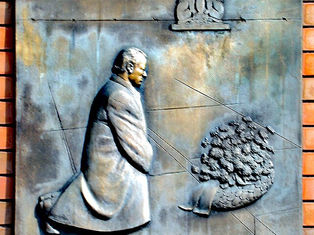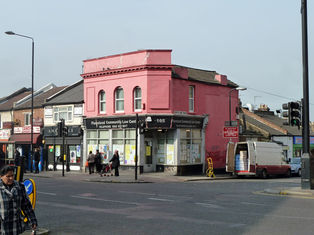top of page
Articles


Anthropocene Boundaries and Planetary Political Thinking
After fifteen years spent debating its scientific potential, and despite claims of procedural irregularities and a challenge to the validity of the vote, in March 2024, twelve of the twenty-two members of the international sub-commission on quaternary stratigraphy chose to reject the applicability of the term ‘Anthropocene’ to signal a new geological epoch. For some geologists and Earth System Scientists, the point of such a designation would have been to signal a determinate

Duncan Kelly
18 min read


Heidegger on Nietzsche’s Political Ontology and Technoscientific Animalism
The following short essay was written as a supplement to an essay published in 2018 [1] which provided an analytic description of Heidegger’s interpretation of Nietzsche’s political philosophy and vindicated Heidegger’s view of this philosophy as fundamentally technological in nature, representing the final stage of Western metaphysics. As Heidegger put it, ‘in the thought of will to power, Nietzsche anticipates the metaphysical ground of the consummation of the modern age’,

Don Dombowsky
19 min read


‘Fair and Responsible’ Re-Presentation of Early Ethnographic Photography
Introduction Recent scholarship on early photography examines the photograph as primary source material in order to identify and explore ‘veins of influence’ that operate on, through, and from it. The ‘veins of influence’ analysis developed in that research brings us, whether as professional creatives, academics, or other participants, into dialogue with the photograph. Through such engagement, we become active participants in and agents of influence, shaping how these earl

Shalini Ganendra
22 min read


Reanimating Isabella D’Este: In Conversation with Sarah Dunant
Sarah Dunant is a novelist, broadcaster, and cultural critic whose work blurs the line between historical inquiry and literary imagination. Best known for her fiction set in Renaissance Italy, she gives voice to women whose lives have been obscured by time, deftly merging narrative and historicism. Rendering the past not as backdrop but as pulse, Dunant allows history to unfold with the texture of lived experience. Her acclaimed novels, The Birth of Venus , In the Company of

Lily-Rose Morris-Zumin
22 min read


Cycles and Eternities: Renaissance from an Egyptological Perspective
Abstract In popular discourse, the idea of ‘renaissance’ is rarely associated with Ancient Egypt, but one has to wonder why. Throughout its long history, the land of the Pharaohs underwent a series of transformations, with centralised kingdoms repeatedly disintegrating into a patchwork of regional polities and then being ‘reborn’ several centuries later under unified rule. The reasons for these transformations, and subsequent revivals, were much the same as those we face no

Alexandre Loktionov
13 min read


A Radical’s Elegy for England: Darcus Howe and the White Tribe
Dog-races, football pools, Woolworth’s, the pictures, Gracie Fields, Wall’s ice cream, potato crisps, Celanese stockings, dart-boards, pin-tables, cigarettes, cups of tea, and Saturday evenings in the four ale bar.[1] This rapid-fire enumeration of distinctive features of Englishness, one of George Orwell’s recurring party-tricks, seems today a tall order. What is it to be English? Those like Tory MP Robert Jenrick rely on inane tautologies: English identity is simply English

Jack Graveney
26 min read


The Origins of Art: ‘Sentio ergo sum’
Art has been part of our being for millions of years—possibly even before the beginning of our genus Homo—without being understood as what we now call art. From the beginning, it was simply another way of knowing, probably our first, of coping with what confronted us in our environment as a necessary way of surviving in it and sharing that knowledge with others. It sprang from an emotional reaction to what existed outside of us and how we translated that feeling to pass it on

Don Foresta
30 min read


Ornament as Design: Azulejos Tiles as Hybrid Language
Blue and white, occasionally with touches of yellow, ceramic tiles adorn not simply the façades and interiors of countless Portuguese...

Caroline DeFrias
20 min read


History in Turmoil
Convince an enemy, convince him that he’s wrong Is to win a bloodless battle where victory is long A simple act of faith, in reason over...

Dmitri Safronov
50 min read


A Revolution in Thought? How Hemisphere Theory Helps us Understand the Metacrisis
Carved into the stone of the ancient temple of Apollo at Delphi was the injunction to ‘know thyself’. Without such knowledge we are tossed this way and that by forces we neither suspect nor understand. Knowing ourselves helps explain our predicament; and doing so is greatly aided by understanding an aspect of the way in which the brain constructs the world. I believe we have adopted a limited vision of a very particular type, and precisely because it is limited we cannot se

Iain McGilchrist
30 min read


Jonathan Sumption’s Conceptual Gaps and Misconceptions on Historical Apologies and Judicial Diversity
I. Introduction Jonathan Sumption—once described by The Guardian as ‘the brain of Britain’—is a professional historian and former...

Alberto Alvarez-Jimenez
19 min read


When Is an Artwork Finished? Revisiting the Question
When is an artwork finished? Ann Landi, a contributing Editor of ARTnews , wrote an article that explored the question of when an...

Amir Pichhadze
17 min read


Traversing Boundaries: In Conversation with Peter Krausz
Peter Krausz was born in Romania in 1946. He studied mural painting from 1964 to 1969 at the Bucharest Institute of Fine Arts. Since 1970, he has made Montreal his home. His diverse artistic production includes painting, drawing, installation, and photography. From 1980 to 1990, he was the curator of the Saidye Bronfman Centre Art Gallery and a teacher at Concordia University. In 1991, he joined the faculty at the University of Montreal where he is now a tenured Professor of

Gabriella Kardos
16 min read


The Hidden Life of Books, Chapter IV: Samuel Coleridge-Taylor and The Americans
The book is a simple yet complex idea that has profound influence on culture, society, and religion that transcends time and civilization. The book is a platform or foundation for the study of the Humanities because it has so much power over the course of human life. The impact of books and the knowledge contained dictates human history, influences religious and political policy, supports the powerful, and inspires the repressed. In early book creation the relationship betwee

Laura Migliorino
4 min read


Hearts of Darkness: Meeting Mengele
Most first novels are emotionally explosive, going to the heart of the individual. Novelist Paul Pickering changed from journalism to...

Paul Pickering
8 min read


Afrodescendants Claim Rights to Benin Bronzes—They Belong to All of Us
We are the Restitution Study Group (RSG), a New York-based non-profit founded in 2000 to campaign for innovative approaches to healing...

Deadria Farmer-Paellmann et al
8 min read


Is Peace Merely About the Attainment of Justice? Transitional Justice in South Africa and the Former Yugoslavia
As a field of scholarship and practice, Transitional Justice (TJ) has become the dominant framework through which to consider ‘justice’ in periods of political transition ever since the end of the Cold War.[1] Understood here as ‘the full range of processes and mechanisms associated with a society’s attempts to come to terms with a legacy of large-scale past abuses, in order to ensure accountability, serve justice and achieve reconciliation’,[2] TJ systems are founded on the

Alejandro Posada Téllez
18 min read


Politics in a Multiplex World: In Conversation with Amitav Acharya
Amitav Acharya is the UNESCO Chair in Transnational Challenges and Governance and Distinguished Professor at the School of International...

Richa Kapoor
17 min read


A Flawed Democracy
Each year, The Economist publishes a Democracy Index. The 2022 edition listed 167 countries ranked on metrics of five dimensions: electoral process and pluralism, the functioning of government, political participation, democratic political culture, and civil liberties. The US ranked 26th in the world. At the top of the list were Norway, New Zealand, Finland, and Sweden. At the bottom were North Korea, Myanmar, and Afghanistan. No real surprises there, but Taiwan (8), Uruguay

John Rennie Short
21 min read


Karl Heinz Bohrer’s ‘A Little Pleasure in Decline. Essays on Britain’
Karl Heinz Bohrer’s A Little Pleasure in Decline. Essays on Britain. [1] My friend Karl Heinz Bohrer died on 4 August 2021. He was seen...

Giles MacDonogh
14 min read


‘Private Vices, Publick Benefits’ in Permissive Democracies: Mandeville’s The Fable of the Bees in the Context of Transgressions by Western Political Classes
Introduction The work of many 17th-18th century thinkers on politics and society continues to shape modern discourse, with notable contributions including Thomas Hobbes’s Leviathan (1651), John Locke’s A Letter Concerning Toleration (1689), and Jean-Jacques Rousseau’s Discourse on the Arts and Sciences (1750). The renown enjoyed by a small number of thinkers should not, however, divert us from more obscure but equally significant works from the period. The Anglo-Dutch crit

Daniel Morgan
14 min read


Heraldic Politics: Why Flags Still Matter
The Estonian flag is a blue-black-white tricolour. Or at least it should be. As a foreign correspondent in 1990, I was puzzled to see...

Edward Lucas
5 min read


The Fight for Survival Fifty Years On—A Brief Synopsis on Law Centres in the UK
Introduction Law centres are providers of legal aid and have been in existence since the early 1970s. Their main role has been to assist those that reside within their local communities. They specialise predominantly in social welfare or ‘poverty’ law as their legal representatives possess detailed knowledge about the problems their local residents face. This article is divided into timeframes and will consider the development of law centres in the UK from 1945 to 2021. Betwe

Ayesha Riaz
33 min read


‘The Eyes of the World Are Upon You’: The Role of International Organisations in the Suez Crisis
Introduction Gamal Abdel Nasser savoured the moment: it is 26 July 1956 and he has just announced the nationalisation of the Suez Canal....

Asa Breuss-Burgess
40 min read
bottom of page

